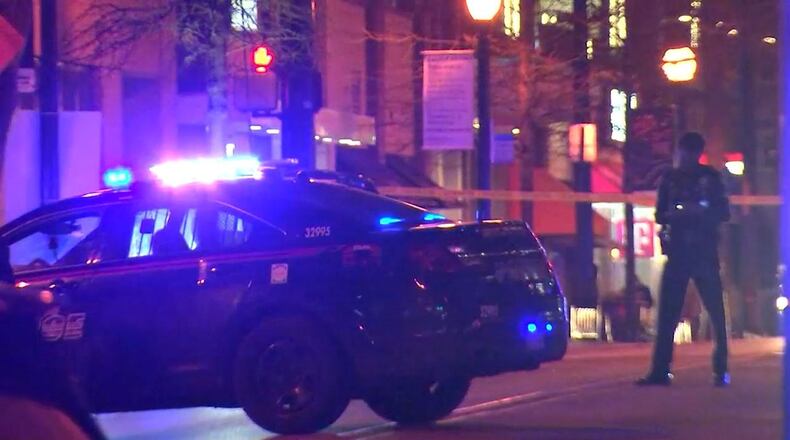Editor’s note: This piece was written before Atlanta Mayor Keisha Lance Bottoms announced her decision not to seek re-election.
Prior to last summer, Atlanta’s crime rate had been on a 30-year decline, achieving a level of crime lower than any time since the 1980s. But the events of last year demonstrate how fragile the fabric of public safety can be.
The surge in violent crime that has held Atlanta in its grip since last summer has sparked a continual flow of critiques, concerns, and calls for more effective law enforcement.
The cacophonous debate on public safety – prompted by fear, concern, and even outrage – is, however, a healthy sign that our citizens and leaders are focused on the need for change.
As citizens continuously remind us, public safety is always their top concern.
Credit: contributed
Credit: contributed
This rancorous, but appropriate, community discussion has yielded actions and decisions with positive near-term and long-term public safety impacts, among them:
- Chief Rodney Bryant’s designation as permanent Chief of Police
- The One Atlanta, One APD Community Policing plan
- Greater enforcement of anti-gang and street racing ordinances
- Expansion of the Operation Shield camera surveillance system
- Enhanced recruitment of APD officers
- The mayor’s commitment to build the Public Safety Training Center
- Empaneling a new Commission on Law Enforcement
Designating Chief Bryant as “permanent” underscores the mayor’s confidence in him. It is appropriate and well-deserved. It enhances his authority among rank-and-file officers and incentivizes this accomplished, 30-year APD veteran to forcefully implement the strategies he and his command staff have developed.
Those strategies are embodied in the recently announced One Atlanta, One APD community policing plan. Actions already being implemented include collaborating with federal, state and local law enforcement agencies to address gang violence, strict enforcement of street racing ordinances, and opening APF’s second At-Promise Center to combat youth crime. The Chief has also announced the reactivation of the Repeat Offenders unit to focus on those convicted felons who disproportionately account for much of Atlanta crime.
One Atlanta, One APD lays out steps to reform police accountability, reinforce training that emphasizes de-escalation tactics and policing that protects the civil rights of all citizens. These programs will have impact over time – but they are essential to creating an effective 21st-century police force.
Operation Shield, APD’s canopy of surveillance cameras and license plate readers, has proven to be an effective crime deterrent and an invaluable tool in solving crimes. The Atlanta Police Foundation is working with APD, neighborhoods, private-sector businesses and the city to add 250-plus cameras in 2021.
In full swing is APD’s aggressive program to hire 750 new police officers over the next three years. The goals: erase the current 400-officer deficit from full complement and ensure that we replace those officers scheduled to retire in the coming years.
The Public Safety Training Center (PSTC) for APD and Atlanta Fire/Rescue is the most important commitment that our city has made to enhance public safety in 50 years. This multi-year investment to provide state-of-the-art career training is a long-term commitment to policing excellence that our citizens deserve, and our sworn officers have yearned for.
- The PSTC will be a 150-acre campus of state-of-the-art facilities on long-dormant, city-owned land.
- Half its total cost will be paid for by the private sector and philanthropic community.
The PSTC is seminal. It tells rank-and-file officers that they will be trained to the highest standards, provided best-in-class resources and will be expected to perform their duties with the utmost professionalism and respect for the citizens they’re sworn to protect.
Public safety is predicated on the ability of a law enforcement agency to build morale, stem attrition and sustain recruitment – each a soft spot over the past couple years. The Public Safety Training Center fundamentally changes this dynamic from within, instilling an institutional pride that will attract dedicated and committed law enforcement professionals from across the region.
Everyone agrees that we need action now to stem the rising tide of crime. But don’t underestimate the power of a formal community debate and discussion that focuses on policing and public safety. We’ve been having it nonstop for years in many forums, but this new commission – the mayor’s own – will be well-placed to serve as a real-time channel for constructive criticism and an impetus for action.
Improving morale, stemming police attrition, attracting a full complement of officers, increasing police visibility, ensuring our law enforcement professionals are well-trained and equipped, and committed leadership from a dedicated chief and command staff are essentials to reducing crime.
Progress comes in fits and starts but citizens’ concerns, police ambitions, and political will are better aligned than at any time in recent years to deliver results.
Dave Wilkinson is Atlanta Police Foundation president and CEO.
About the Author
Keep Reading
The Latest
Featured




